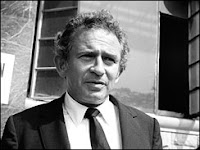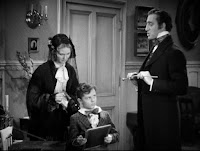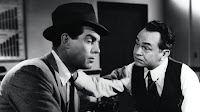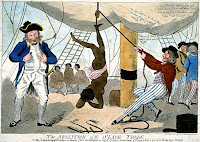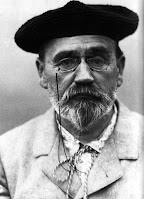Jan. 31, 1923— Combative in war and peace alike, Norman Mailer, who won Pulitzer Prizes for two works that straddled fiction and nonfiction, The Armies of the Night and The Executioner’s Song, was born in Long Branch, NJ.
With his first novel, The Naked and the Dead, Mailer, along with Irwin Shaw (The Young Lions) and James Jones (From Here to Eternity), formed a trio of WWII veterans who wrote sprawling fictional accounts that attempted to capture both their personal experiences and the disruptive impact of the conflict on American servicemen.
The three measured themselves against Ernest
Hemingway’s achievement with A Farewell to Arms. But most critics agree
that, despite massive sales, none matched the impact of that landmark WWI novel.
At this point, Jones’ account is best remembered
indirectly, through the 1953 Best Picture Oscar-winning film adapted from it.
Shaw, producing novels commercially successful if uneven in quality, has found a secure niche for his many superb short stories.
Mailer’s case for literary posterity is trickier. His ambition and bravado were every bit as immense as his talent.
He was never afraid to dare greatly, even if he risked looking foolish—which he
did, repeatedly, and with all too few signs of having learned from his
experiences.
David Denby’s December critical reappraisal
of Mailer in The New Yorker argued that the novelist
never really got over the war, in which his military service forced a
never-ending feedback loop with an aggressive stance against the postwar world:
“The enormous success of The Naked and the Dead
left Mailer uneasy. He had no idea how he was going to live up to it. Seemingly
on top of the world at twenty-five, he feared many things. In his novel, the
Harvard-educated liberal allows himself to be trapped by power. Mailer, in his
own eyes, needed to escape the traps not only of his soft middle-class Jewish
background but also of postwar America--the desire for ‘security,’ the endless
consumerism, and what he took to be the country's humiliating spiritual
mediocrity. It's as if he were still in the jungle, pulling artillery through
the night. He had made himself into a novelist in the Pacific, and now he
brought the war home, fighting on two fronts—against what he disliked in
himself and against those menaces of the nineteen-fifties, ‘conformity’ and ‘adjustment.’
He acted out his rebellion in a continual performance with phallus, fists,
booze, and sustained ass-in-chair writing sessions—a pressure at times noble,
at times foolish, and certainly rough on other people as well as on himself. He
became an egotist of a peculiarly self-afflicting sort, both calculating and
spontaneous, provoking many blows, all of them deserved, all of them welcomed.
For the author of The Naked and the Dead, the truce never arrived.”
At his best, in person, Mailer could make self-deprecating
jabs at his considerable ego and awe listeners with jeweled phrases that came
effortlessly to hand—as I witnessed firsthand when I covered his appearance in
a seminar at Columbia University’s Writing Division in the School of the Arts
back in February 1981.
*He thought while writing The Naked and the Dead
that it was "the greatest book since War and Peace and maybe even
better," but now admitted wryly that his idea of the book "was higher
than it deserved.”
*He chuckled at Truman Capote’s claim that he relied
on his photographic memory in lieu of taking notes for In Cold Blood: “I
love Truman Capote in 82 ways, but he's a terrible liar. I know he doesn't
remember conversations we've had two or three days ago."
*He had used point of view in his own work either as an
obtrusive ego, "a burning type of light," or an invisible,
disembodied "voice coming over the hill."
At the same time, Mailer pointed out a reason for both
his remarkable productivity starting in the 1960s and his prodigal misuse of this
creative energy: “I made three movies in the Sixties—directing, writing, and
starring in them—and they all failed. I lost $300,000. I've been in debt ever
since."
As Mailer was telling the writing students this, he
was only months away from a supporting role in yet another movie: philandering
architect and murder victim Stanford White, in Milos Forman’s adaptation of
E.L. Doctorow’s Ragtime.
One can’t resist thinking that Mailer identified with the
intersecting creativity, lust and violence in this figure at the heart of one
of the most notorious scandals in early 20th-century America. If he
had never equaled Hemingway’s feat of fashioning a virtually new writing style,
he had Papa beat in the number of wives (six versus four) and children (nine
versus three).
(Knowing the wink-wink style of so much of the Gilmore
Girls TV series, I can’t help thinking a similar spirit was at play when it
titled one episode, “Norman Mailer, I’m Pregnant!”)
Besides a scandalous private life, another major
factor that may ultimately lower his critical reputation could be the baggy monsters
of novels that he cranked out starting with The Executioner's Song: Ancient
Evenings, Harlot’s Ghost, and Oswald’s Tale.
Over 30 years ago, while interviewing for a copyediting
job at a magazine with a reputation for publishing high quality, I was told by
a senior editor just how far my authority would extend: “You’ll have to keep in
mind who you’re dealing with when you make suggestions in a manuscript. Listen:
Norman Mailer will make more from a single article here than you will with your
entire yearly salary.”
How many editors, even ones with considerably higher
reputations than I would have had starting out, shied away from battling with
Mailer? They could go mano-a-mano line by line, chapter by chapter with a
manuscript, or they could watch him take his wares to someone else willing to let him write whatever tripe he liked. Neither alternative was appealing.
But with the novelist dead 15 years now, The Mailer Wars are beginning in earnest now.
On one side you have broadsides like this from “One-Way Street” blogger Richard Prouty, who, after Mailer’s death in 2007, predicted
that his influence would be “nil” and saw “his only truly original creation” being
“journalism mixed with self-aggrandizement, a combination…that can be described
as literature as performance art.”
On the other side are defenders like English and film
professor Phillip Sipiora, who calls Mailer “arguably the foremost public
intellectual of the second half of the twentieth century,” and Denby, who
writes that it would be “naïve to pretend that he was not a great American
writer.”
My own initial instinct, given the sheer quantity of
bad, even idiotic, work Mailer produced over nearly six decades in the public
eye, is to lean closer to Prouty than Denby or Sipiora.
But it might be more accurate to see him as a kind of
American literary counterpart to the actor Richard Burton, another creative
figure who wasted his overwhelming talent in scandal and never-ending substandard
projects meant to satisfy his craving for fame and money.
An unblinkered assessment would find that, like Burton,
Mailer could, at moments, with his energy focused tightly on work at hand, rank
with the very best of his contemporaries.
The Armies of the Night
may have the best chance of any of his works of continuing to be read and
re-read. It masterfully balances opposites: fiction and nonfiction, comedy (his
own larger-than-life persona, enlarged even further through referring to himself
in the third person) and the deepest seriousness (the stakes of a government
not called to account for its mishandling of the Vietnam War), and the yawning,
increasingly unbridgeable divide between the student protesters and the
working-class soldiers and marshals facing off against them in front of the Pentagon—a
harbinger of today’s “woke” left and Trump voters.
And there is the sheer exhilaration of Mailer's high style
in passages like this:
“Arrayed against them as hard-core troops: an elite!
the Freud-ridden embers of Marxism, good old American anxiety strata—the urban
middle-class with their proliferated monumental adenoidal resentments, their
secret slavish love for the oncoming hegemony of the computer and the suburb,
yes, they and their children, by the sheer ironies, the sheer ineptitude, the
kinks of history, were now being compressed into more and more militant stands,
their resistance to the war some hopeless melange, somehow firmed, of Pacifism
and closet Communism. And their children—on a freak-out from the suburbs to a
love-in on the Pentagon wall.”
